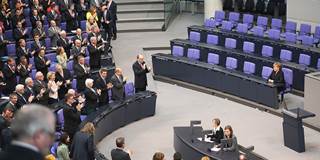While Germany’s center has held, its policy consensus is about to be tested. With the far-right AfD party in the Bundestag, the German public will be exposed to more radical positions on foreign affairs than have been heard in the country in over a generation.
BERLIN – The outcome of Germany’s federal election holds a crucial lesson for the European Union: even the country that has been the EU’s bedrock of stability amid crisis is not immune to political fragmentation and polarization. Although Chancellor Angela Merkel will almost certainly gain a fourth term, her new government is likely to be considerably weaker than the three that preceded it.
The Bundestag now counts six factions, compared to four in the previous electoral term. Merkel’s center-right Christian Democratic Union took 33% of the vote, its worst result since 1949, though still enough to give the CDU the most seats in parliament. The center-left Social Democrats (SPD) – Germany’s second-largest political party, and a part of Merkel’s last governing coalition – also hit a post-war low, receiving just 20.5% of the vote.
Meanwhile, the populist Alternative für Deutschland (AfD) won 12.6%, making this anti-euro, pro-Russia, and staunchly xenophobic party the first far-right party to enter the Bundestag in almost 60 years. And the SPD has thrown in the towel, vowing to spend the coming electoral term in opposition.

BERLIN – The outcome of Germany’s federal election holds a crucial lesson for the European Union: even the country that has been the EU’s bedrock of stability amid crisis is not immune to political fragmentation and polarization. Although Chancellor Angela Merkel will almost certainly gain a fourth term, her new government is likely to be considerably weaker than the three that preceded it.
The Bundestag now counts six factions, compared to four in the previous electoral term. Merkel’s center-right Christian Democratic Union took 33% of the vote, its worst result since 1949, though still enough to give the CDU the most seats in parliament. The center-left Social Democrats (SPD) – Germany’s second-largest political party, and a part of Merkel’s last governing coalition – also hit a post-war low, receiving just 20.5% of the vote.
Meanwhile, the populist Alternative für Deutschland (AfD) won 12.6%, making this anti-euro, pro-Russia, and staunchly xenophobic party the first far-right party to enter the Bundestag in almost 60 years. And the SPD has thrown in the towel, vowing to spend the coming electoral term in opposition.